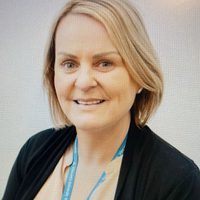Before you watch this webinar
Enhancing your learning experience begins with understanding you better. Collecting data enables us to tailor our educational content specifically for our audience. Discover more about how we handle your information in our Privacy Policy.
This area of the website is reserved for healthcare professionals as it contains information created for a healthcare professional audience.
Event
Discussing the unspoken: Speech & Communication difficulties in MS - Insights into the real impact of changes in speech and communication ability to the person with MS, MS services and the NHS
Our sponsor

Webinar objectives:
- Understand the impact of speech and communication difficulties in MS.
- Understanding the current evidence for management of speech and communication difficulties, and areas for potential research in the future.
- How can we support people with MS early to remain in work?
- How can we support pwMS with more advanced communication difficulties?
- Unpicking the complex multiple crossover of symptoms - what is important for us to know?
Slides
Write-up
Chair: Dr David Paling Consultant neurologist, Honorary strategic director, MS Academy, Sheffield Teaching Hospitals NHS Foundation Trust
Speakers:
Sinead Jordan, Advanced nurse practitioner, St. Vincent's Healthcare Group
Sherridan Daly, Highly specialist speech and language therapist, Surrey Downs Health and Care
Introduction
Communication is “inherent to the human experience” but the processes involved are incredibly complex involving a integration of masses of auditory, somatosensory, and motor information across vast areas of the brain.
It makes sense, then, that so many people living with multiple sclerosis have speech difficulties, said Dr David Paling. Between 40 and 50% have some form of speech difficulties, as identified by another person,[1] [2]. Such problems are exacerbated by cognitive issues,[3] and can be associated with adverse impacts of MS, such as fatigue, a reduction in social support, and unemployment.[4]
Yet despite the prevalence and impact, there is limited advice or guidance on managing speech-related symptoms.
Useful techniques
People experiencing communication difficulties may feel frustrated or embarrassed, said Sinead Jordon, adding that it was important to ask about speech and swallowing during clinic appointments. They may have noticed changes in their own control of their speech, or in the volume or pitch of their voice, for example. They may slur or sound “nasally”.
Sinead recommended referring people to speech and language therapy (SALT) services early, though acknowledged that there might be a long wait. Depending on the cause, there are things nurses can do to help in the meantime.
“It can be made worse by cognitive problems or fatigue, so addressing these can help to alleviate the problem,” she said, adding that techniques such as reducing the rate, or speed, of speech, or pacing or tapping out words can help if the speech is slurred.
“Pacing boards or tapping out syllables can really help someone to stop cluttering their words or their sentences,” said Sherridan Daly.
Where low volume is the problem, amplification systems can be considered, and if ongoing maladaptive behaviour is identified, a scope of the vocal cords may be indicated.
“It is about looking care holistically and tailoring treatment to patients, but that can be difficult with a lack of resources, lack of access, and long waits.
“It is worth linking with your local speech and language therapist and looking to acquire basic skills you could impart on the patient and their family to help,” said Sinead, also advising nurses to signpost patients to services such as the MS Trust.
When to refer
Sherridan said the speech characteristics of people with MS typically fell into the prosody and articulation category, namely articulatory inaccuracy, prosodic excess, and phonatory-prosodic insufficiency.
“Articulatory inaccuracy may be imprecise consonants, or distorted vowels… Prosodic excess is where they might be prolonged speech sounds, such as holding on to a sound for a lot longer, prolonged intervals in between words, or a slow or disjointed rate. Phonatory-prosodic insufficiency relates to pitch. It could be that the pitch stays very much the same note, the volume could be very loud or very soft, or their voice could sound strained, strangled, or harsh,” she said.
Sherridan agreed that prompt referral to SALT services was important, particularly as some interventions were more effective when initiated early. Explaining the process, she said her team would assess the breakdown in the speech process, the impact on communication and lifestyle, and any driving cognitive factors. Based on this information, the therapists may provide a maintenance therapy plan which may include personal and environmental speech strategies and/or access to communication aids.
Therapy and compensatory approaches
Therapy tends to start with breathing exercises, breath support and relaxation techniques. There is also some evidence to support Expiratory Muscle Strength Training (EMST), a rehabilitation approach first introduced for people with Parkinson’s disease.[5]
Vocal hygiene advice can sometimes help with voice pitch and volume issues. It includes tips such as staying hydrated and trying not to use the voice when tired.
When dysarthria is identified, oromotor exercises may be useful, but it is important to balance these against other MS symptoms. “We do not want to cause any unnecessary fatigue,” said Sherridan.
Useful compensation strategies nurses can recommend include:
- Slowing the rate of speech
- Using single words instead of full sentences
- Emphasising key words
- Reducing background noise, by Turning off TVs or radios in the background, for example
- Rephrasing sentences, or using gestures or facial expressions to communicate meaning
- Communicating through writing, if possible
There may also be things the person the patient is communicating can do, such as always facing the person to enable lip reading.
“We also check that is the partner needs hearing aids that they are wearing them. A common problem we see is that someone has a speech problem and their partner has a hearing problem and the combination exacerbates everything,” said Sherridan.
Nurses may also want to check the person’s medication, as some drugs have speech-impacting side effects such as dry mouth.
ACC
Augmented alternative communication (AAC) may also be useful. Low-tech ACC can include simple communication boards or books, whereas high-tech products will utilise technologies such as smartphones or tablets.
“When thinking about referring to someone to SALT, think about what type of technology they might be able or willing to use,” said Sherridan.
Voice banking, in which people record words or phrases with their own voice or with a personalised synthetic voice, in mainly used in motor neuron disease. However, it is sometimes used by people with MS who may completely lose their voice due to dysarthria, with many viewing it as a form of “insurance”.
Message banking, which involves simply recording audio on their phone, is another option. Sheridan said: “It can be things like them saying I love you, them laughing, saying their partner's name… so they will always have that there if they wanted to use it at a later point.”
Ultimately, solutions should be tailored to the patient, their symptoms and the causes, as well as their personal preferences, Sinead and Sherridan agreed.
[1] Feenaughty, L., Tjaden, K., Weinstock-Guttman, B., & Benedict, R. H. (2018). Separate and combined influence of cognitive impairment and dysarthria on functional communication in multiple sclerosis. American journal of speech-language pathology, 27(3), 1051-1065.
[2] Feenaughty, L., Guo, L. Y., Weinstock-Guttman, B., Ray, M., Benedict, R. H., & Tjaden, K. (2021). Impact of cognitive impairment and dysarthria on spoken language in multiple sclerosis. Journal of the International Neuropsychological Society, 27(5), 450-460.
[3] Feenaughty, L., Guo, L. Y., Weinstock-Guttman, B., Ray, M., Benedict, R. H., & Tjaden, K. (2021). Impact of cognitive impairment and dysarthria on spoken language in multiple sclerosis. Journal of the International Neuropsychological Society, 27(5), 450-460.
[4] Baylor, C., Yorkston, K., Bamer, A., Britton, D., & Amtmann, D. (2010). Variables associated with communicative participation in people with multiple sclerosis: A regression analysis.
[5] Srp, M., Capek, V., Gal, O., Havrdova, E. K., Jech, R., Korteova, R., ... & Hoskovcova, M. (2021). Severely disabled multiple sclerosis patients can achieve the performance of healthy subjects after expiratory muscle strength training. Multiple Sclerosis and Related Disorders, 55, 103187.
Our sponsor

CPD accreditation
'Discussing the unspoken: Speech & Communication difficulties in MS - Insights into the real impact of changes in speech and communication ability to the person with MS, MS services and the NHS' has been approved by the Federation of the Royal Colleges of Physicians of the United Kingdom for 1 category 1 (external) CPD credit(s).
Chair
 Dr David Paling
Dr David PalingHonorary strategic director & consultant neurologist, Sheffield Teaching Hospitals NHS Foundation Trust
Speakers
 Sinead Jordan
Sinead JordanAdvanced nurse practitioner, St. Vincent's Healthcare Group
 Sherridan Daly
Sherridan DalyHighly specialist speech and language therapist, Surrey Downs Health and Care
Encouraging excellence, developing leaders, inspiring change
MS Academy was established in 2016 and in that time has accomplished a huge amount with exciting feedback demonstrating delegates feel inspired and energised along their personal and service development journeys. The various different levels of specialist MS training we offer are dedicated to case-based learning and practical application of cutting edge research.